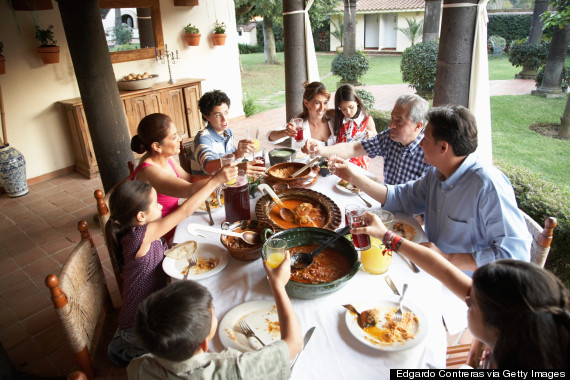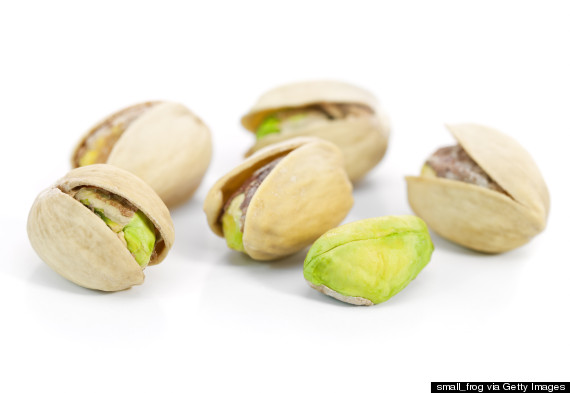
Unless you're a competitive eater, there's really no reason to scarf down your meals. After all, doing the opposite -- that is, slowing down -- is likely better for your waistline, according to a new review of studies.
The review, published in the American Journal of Clinical Nutrition, included 22 different studies that examined food consumption through computerized feedback, human instructions, food texture and utensils used in eating. The results showed that eating slower is linked with statistically significant weight loss.
But how do we slow down when we chow down? Nutrition experts shared their best tips.
1. Take A Seat
Many people eat on the go, meaning they stand while they grab a meal. Whether it's at your desk, walking down the street or standing around your kitchen counter, "The Biggest Loser" nutritionist and HuffPost blogger Cheryl Forberg, R.D., says this is a clear sign that they’re rushing through a meal to get to something or somewhere else. To stop speed-eating, sit down at a table.
2. Unitask
Many of us veg out in front of the TV, mindlessly shoveling food into our mouths. But as we already know, we're no good at multitasking, so stop reading the paper or watching reruns while you eat. Focusing on what you're putting into your mouth can help you slow down and really pay attention to the task at hand. “Enjoy it, savor it and your mindfulness will replace inhaling your meal with a relaxed pace, more enjoyment and better digestion,” Forberg tells HuffPost.
3. Switch Things Up
Having trouble channeling mindful eating? Maybe it's time to get a little weird. Nutritionist Rochelle Sirota, R.D., C.D.N., recommends adopting some different techniques to help distracted diners slow down and focus. She suggests eating with the nondominant hand, using chopsticks or even setting down the utensil between bites. Eating in an unusual way can help bring back the focus and break quick-eating habits.
4. Socialize
If you're looking for an excuse to host dinner parties on the regular, here's your chance. According to Joy Bauer, M.S., R.D., C.D.N., nutritionist and founder of Nourish Snacks, eating with others can help fast eaters slow their pace by engaging in conversation. “The more you chat, the slower you eat,” she tells HuffPost.
5. Chew More
Chewing more can both bring the focus back to speed and help taper eating pace, simply because it takes longer to swallow each bite. That’s why nutritionist Julie Upton, M.S., R.D., CSSD and blogger for The Huffington Post, recommends trying to chew for 15 to 20 seconds before swallowing. Leaning toward foods that actually require more chewing -- like veggies, fresh fruits and lean proteins, rather than softer casseroles, mashed potatoes, applesauce or ice cream -- can also help speed eaters slow down.
6. Avoid Extreme Hunger
Any time we get too hungry, we tend to scarf down our meals without a second thought. But how can we tell the difference between hungry and too hungry? Upton advises paying attention to your body. If you feel hungry, start planning what to eat, but if your stomach is growling and you have hunger pains, you've let your hunger go too far. Train yourself to start keeping track and listening to what your body's saying.
7. Eat Shelled Snacks
Shelled snacks -- like peanuts, pistachios and soybeans -- slow down eating because it takes time to remove the actual nut or bean from its encasing. They also may provide visual cues that let munchers know when to stop snacking. One study conducted by researchers at Eastern Illinois University found that participants consumed fewer calories from pistachios when they ate shelled ones versus unshelled. That means that shelled snacks kill two birds with one stone, helping eaters consume less and know when to stop.
8. Water Is Your BFF
Water can help you slow your munching in more than one way. Bauer suggests setting down your fork and taking small sips between each bite to stayed focused and regulate speed. Forberg recommends gulping down a glass before you even begin. “This really does help you fill up a bit,” she says. “When we don't feel as starved at mealtime, we eat more slowly.”
9. Time Yourself
Since time is the problem, why not tackle it directly? Bauer recommends setting a timer to help slow down your eating speed. Ideally, it should take at least 20 minutes to finish a meal, and using a kitchen timer can help retrain rushers until they've slowed down.
Related
Before You Go
6 Ways To Avoid Mindless Eating And Excess Calories